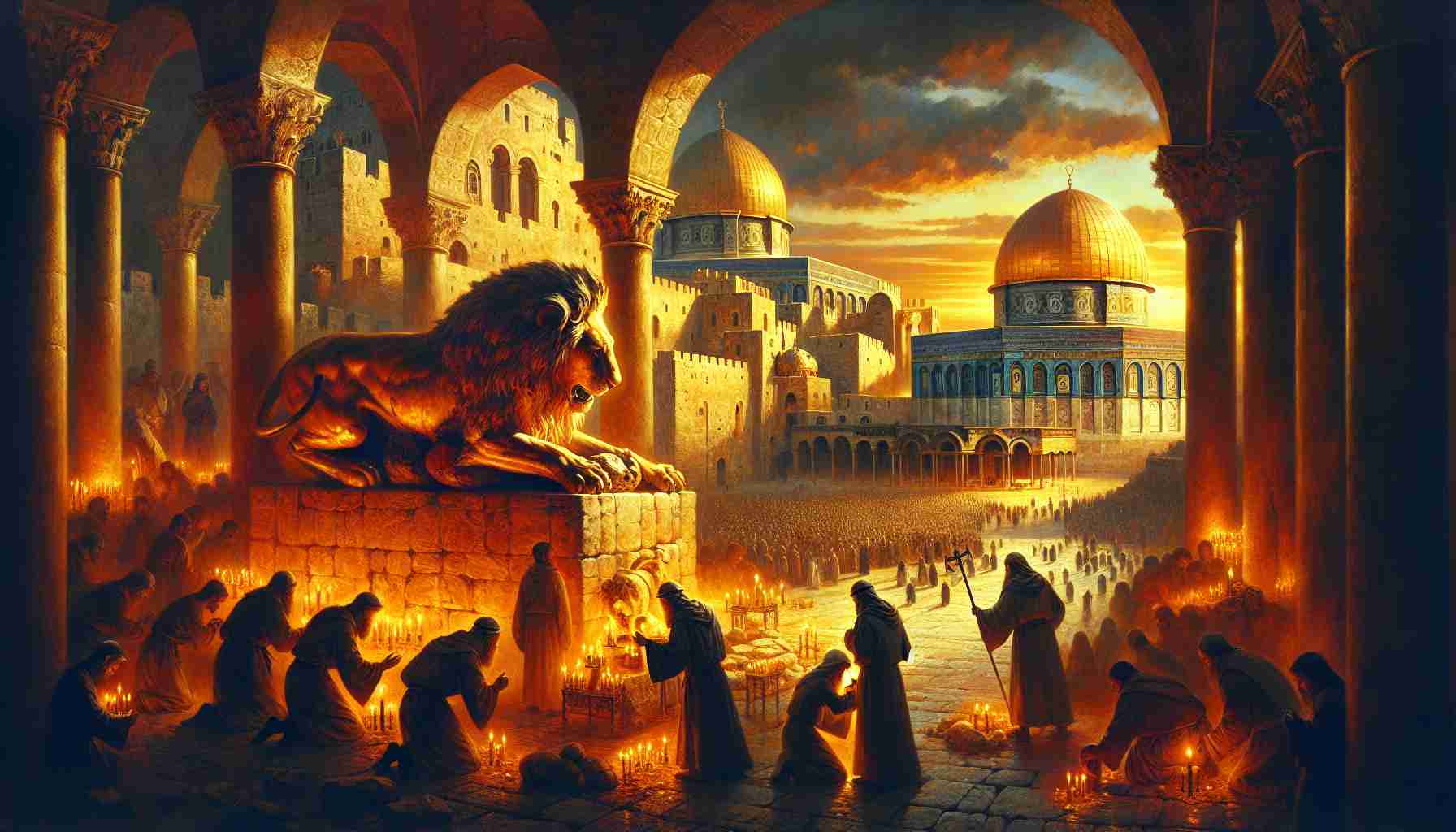

The heat over Jerusalem thickened early, as if the sun itself stood still, watching. On the fourth day of July in the Year of Our Lord 1187, the walls of the holy city trembled—not with cannon or quake—but from the sorrow of its keepers, for the Lion of Islam had come, and the Cross that once gleamed atop her walls was taken down.
Within the Church of the Holy Sepulchre, incense still hung in the heavy air. The chants of Monks rose faintly through the dome. Brother Anselm knelt before the tomb, fingers pressed to stone said to hold Christ’s risen body. The city groaned beyond the colonnades, and the priest pressed Lamentations against his heart: “For the Lord will not cast off forever. But though He cause grief, yet He will have compassion.”
Rumors of Saladin’s kindness had reached him—how at the Horns of Hattin, King Guy was spared when others fell, how women and children had been given safe passage. Still, Jerusalem had fallen. God's city had fallen.
Above the city, on the Temple Mount—once Mount Moriah, where Abraham bound Isaac, where Solomon’s Temple once reigned—Nur ad-Din’s towering minbar awaited in a mosque that now claimed the holy site. Centuries of conflict tangled beneath those stones: David's capital, Roman scars, Byzantine mosaics, all vanished beneath sand, steel, and faith. The call to prayer echoed from the Dome of the Rock, where Crusaders had once stabled their horses, desecrating the shrine built over the Foundation Stone.
In the citadel, Saladin removed his helmet. Sweat gleamed on his brow, caught in his dark beard. His advisors spoke in hushed Arabic. But the Sultan’s eyes remained fixed eastward—toward the Mount, toward the resurrection stone of the Christians, toward the sanctuaries of Abraham’s children. To him, the recapture fulfilled jihad; to the city’s Christians, it meant exile or ruin.
But vengeance was not the order of the day.
Through Ashkelon, Saladin had sent word: no slaughter, no looting, ransoms permitted. As the Franks were gathered to depart, he allowed the destitute safe exit. In silence, he watched them process: Knights of the Templar stripped of arms, pilgrims cradling bones of saints, weeping widows clutching crucifixes. Few dared meet his gaze. Fewer still spoke.
Yet tales would whisper for generations of how Saladin ordered his men escort Christian families beyond the city gates, granting stipends to the old and food to the hungry. From the steep hills where Christ wept over Jerusalem, some turned back and wept anew.
Outside the Church of the Holy Sepulchre, Anselm met a weary knight—armor tarnished, sword unbelted. His name was Edric of Calais. He had buried two sons near Hattin’s dry wells. “We lost the city,” Edric spat, voice low. “And the cross.”
Anselm looked past him, toward the courtyard, where Saracen guards stood with arms at ease. “We lost walls,” he murmured, “not faith.”
“The Saracen shows mercy,” Edric hissed, “but is he righteous?”
The priest opened his palm to the psalter bound in leather. “Though He cause grief, yet will He have compassion according to the multitude of His mercies. We suffer. We grieve. But not as those without hope.”
Three days later, Christian banners no longer fluttered on the citadel. But bells still rang from the Sepulchre at dawn. Saladin had ordered it unmolested. No guards entered. Mass was held. Pilgrims remained under protection. The city breathed again, not in triumph, but in strange peace.
On the Temple Mount, imams recited Al-Fatiha beneath golden curvature of the Dome. Above the re-lit lamp of the Al-Aqsa Mosque, centuries of architectural devotion—Umayyad marble, Abbasid woodwork, Qur'anic calligraphy etched with silver—glimmered once more. Crusaders had nearly erased them. Now, carefully, the light returned.
Some called the Sultan a usurper. Others, a liberator. But even among his soldiers, fear lingered that defiling a shared holy ground might awaken divine wrath. So the mosques were cleaned, not razed; relics were preserved, not scattered. And Jerusalem did not burn.
In Antioch and Rome, the news lit fires. A new crusade would stir—Richard the Lionheart would answer. But in Jerusalem that day, no horn of vengeance sounded. Instead, olive trees swayed in the wind near Gethsemane, where long ago, Christ had knelt in agony. The garden remained, its stones silent. Grass crept between roots once wet with the blood of prayer.
The Christian priests knew—they had not defended Christ’s kingdom. That was not built by stone or sword. “My kingdom is not of this world,” the Christ had said (John 18:36), and His apostles had wept over His death, only to find the tomb empty.
Jerusalem fell, yes. But the stone was still rolled away.
Saladin, from his tower, watched the sun set over the Mount of Olives. The light bathed the walls in gold. There was no laughter, no triumph, only the silence of sacred earth, and the weight of history’s witness.
And in the Church of the Holy Sepulchre, candles flickered. A boy sang psalms in Latin tone. The script on the wall endured: Dominus custodiet introitum tuum: The Lord shall preserve thy going out and thy coming in.
So Jerusalem passed—from crown to crescent—but faith, like wind through her olive branches, did not yield.